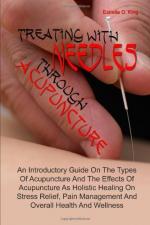|
This section contains 1,715 words (approx. 6 pages at 300 words per page) |

|
All science is based on assumptions that define, a priori, the relative weaknesses and strengths of their practical application. As western science and technology have run up against limits to their comprehension and effectiveness, other approaches to both knowledge and practice have emerged to complement them. Nowhere is this more an issue than in medicine: Acupuncture has become a popular alternative to the drugs and surgeries offered by the biomedical sciences. In its fundamentally holistic approach acupuncture also presents an implicit ethical challenge to western technoscience to see the human patient in his or her entirety and within the context of the patient's life circumstances.
Acupuncture is the practice of inserting thin needles into the body to influence physiological functioning. It is an integral part of Chinese medicine, which also includes herbal medicine, massage, nutrition, and exercise. Chinese medicine began to take form during the Shang dynasty (1766–1050 B...
|
This section contains 1,715 words (approx. 6 pages at 300 words per page) |

|


